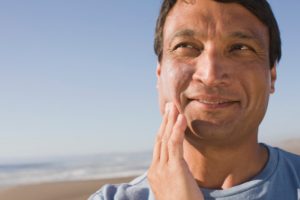
Another 3.5 million will be diagnosed with a less serious form of cancer found on the outer layer of the skin.
Sun damage from radiation
Sun damage occurs when it causes cancer and/or it contributes to aging skin (wrinkling). This is radiation at work in two forms. There is ultraviolet A (UVA) and ultraviolet B (UVB) radiation. UVB causes sunburn and scientists say it plays a role in the development of cancer. UVA penetrates the skin and leads to premature aging.
As we get older our skin becomes more fragile so sunscreen and avoiding sun damage becomes even more important. One of the biggest challenges we face with aging skin is how to protect it from the sun and still get much needed vitamin D. Vitamin D is associated with good bone health. Not having enough vitamin D has also been linked to several diseases.
5 easy ways to protect aging skin
Although too much sun is not a good idea, it is important to remain active and still enjoy the outdoors as we age. We can still do this and avoid sun damage if we pay close attention to protecting ourselves.
Here are 5 simple tips to protect aging skin from the sun.
- Always use sunscreen, no matter what the season: It should be a water-resistant, broad-spectrum product that protects against both UVA and UVB, with an SPF of 30 or higher. A sunscreen with titanium dioxide or zinc oxide is best because it will be less likely to trigger an allergic reaction in people with aging skin. Creams with added vitamin A, D and E are also great. When it comes to applying sunscreen, it is best to do it before you get dressed so you can be sure you haven’t missed any spots. Remember to reapply sunscreen and don’t forget a lip balm with an SPF of at least 30.
- Wear UVP Clothing: Dark outfits with a tight weave can protect the skin; however, they are not a great choice for older people because they get hotter than loose, light-colored clothing. Choose leisurewear with an ultraviolet protection factor (UVP) of above 30. Think of UVP as the fabric alternative to SPF. The factor determines how much visible light can pass through the fabric. Some fabrics that provide the best protection are: shiny polyester blends, bamboo/cotton blends, 100% polyester among others. Knits and bleached cotton tend to provide less protection.
- Wear a good hat: Purchase a hat with a wide brim. Hats with a minimum brim of 3 inches are considered adequate protection. They block UV rays to the sides of the face and ears. For maximum sun protection get a 4-inch brim. Make sure your hat is made of UVP material. If the factor is 50+ it will block 98 percent of the sun’s rays. Hats made of natural straw, raffia, and hemp are excellent examples.
- Use Sunglasses: The skin around our eyes is seven to ten times thinner than other skin on our body. As we age it becomes even thinner due to loss of collagen, elastin and loss of hydration. Sunglasses protect the delicate area surrounding the eyes. UV rays from the sun contribute to cataracts and macular degeneration so sunglasses are important protection for this reason as well.
- Check the clock: UV is the strongest when the sun is at its highest in the sky. This is normally between 10 a.m. and 4 p.m. People who are fair skinned are more prone to sunburn so they may want to plan outdoor activities based on the time of day. While UV exposure is the greatest in the summer, it is important to keep in mind that in the United States, UV rays can reach the earth every day, including in winter. Snow can reflect 80 to 90 percent of the sun’s UV rays. For this reason, sunscreen is recommended all year long.
It is true that sometimes skin can repair itself, but nothing can completely undo sun damage. Doctors urge everyone to start protecting from sun exposure at an early age, as opposed to waiting until later in life. We can delay changes in our skin linked to aging by staying out of the sun, covering up, wearing a hat, using sunscreen and remembering to protect our eyes as well. After a while it becomes part of a daily routine – much like brushing our teeth and combing our hair. Not doing it could be life altering.
Related Reading:
Why too much sun is bad for seniors this summer
Summer for many people means great friends, barbecues and plenty of time in the fresh air. However, at one point or another, each and every one of us has felt the sting of the common sunburn. Continue reading
Strawberries and the sun – The odd connection
Diets that are rich in fruits and vegetables are known to have good health benefits and new research is showing that one fruit, in particular, may provide an added good health benefit as well. Strawberries may help to protect against the damaging effects of ultraviolet rays as well. Continue reading
Sources:
http://blog.ehealthmedicare.com/2014/05/sunscreen-for-senior-citizens/
http://www.agingcare.com/Articles/Protecting-Senior-Skin-from-the-Summer-Sun-147114.htm
http://www.medicinenet.com/script/main/art.asp?articlekey=90842
http://www.bayhealth.org/media/File/Steps/NLStepsJune10.pdf
http://www.cancer.net/navigating-cancer-care/prevention-and-healthy-living/protecting-your-skin-sun
http://www.cancer.org/cancer/cancercauses/sunanduvexposure/skin-cancer-facts
http://www.sunprotectionhats.com/Sun-Hat-Guide.html